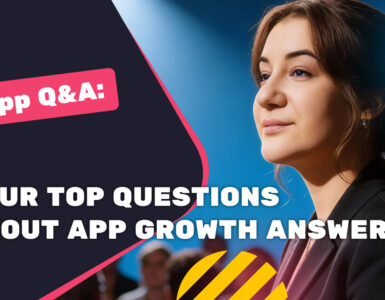All the app marketing starts with App Store Optimization and even if you disagree with this the numbers and statistics say the opposite if to conduct the research and test different approaches both on Google Play and AppStore. As you can remember from our previous articles, without ASO it is not possible to attract users both from organic and paid searches due to the fact that visual and text optimization influences the conversion rate significantly. But at the same time, it is necessary to keep in mind that a successful ASO strategy is not possible without conducting keyword research and that’s what we will discuss in this article. By the way, to make your ASO process even more successful, avoid these mistakes to make sure you go the right way.
Why is keyword research so important?
Keywords are the fundamental words and phrases utilized by users to discover applications on app stores. When we navigate through Google Play or the AppStore, we invariably rely on keywords to search for apps that pique our interest. The same principle applies to mobile app marketing. When a developer creates an app, their ultimate goal is to generate revenue, as an app is essentially a business venture, much like any other entrepreneurial idea in various niches. However, realizing this financial potential requires a series of strategic processes to draw in users. In essence, a developer’s role boils down to two primary objectives: attracting users and profiting from the app.
But is user acquisition (UA) exclusively dependent on paid strategies? Certainly not. The other critical aspect is organic traffic, and this is where App Store Optimization (ASO) can play a significant role. We’ve explored the impact of ASO on organic traffic in many of our articles, and it’s important to emphasize once again that the first step in effective App Store Optimization is thorough keyword research.
Keyword research is a process of gathering a semantic core that is relevant to your application and may be used by organic users to find it on the store. So in general the way you proceed with keyword research influences the number of organic traffic the application will generate. If to talk about the pros of keyword research in more detail, it is important to mention that by gathering the requests for your app you will get:
- All the keywords for which your application may be found on the store in general
- The keywords for which an app is already indexed
- The app positions for all the relevant search requests
- The approximate popularity score for all the relevant requests
Based on the keyword research you can already decide how to proceed with App Store Optimization and which requests may give the app the best results and profit. So as we may see from the facts above keyword research is an essential part of ASO and organic traffic attraction. But the next question is: how to gather the keywords for your app quickly and efficiently so as not to spend a lot of time and be ready to proceed with the actual promotion?
Our challenge of keyword cloud gathering without ASO tools
As you may know, ASO is quite a new sphere and if to go back to earlier times it was much more difficult to gather the keywords for the app. Although taking into account the number of processes you need to proceed with doing ASO, it becomes understandable that keywords should be gathered quickly. Modern mobile marketing tools give the possibility to find the keywords within several minutes and already have the full research within several hours you started, but it wasn’t so previously. If to be honest, several years ago, when we started the path in ASO and keyword promotion, the situation was completely different and there were no additional tools for keyword research (that’s why we have the keyword analytics as we completely understand its importance), as a result, we were forced to spend not hours, but days to find the suitable requests for the application we work with. And of course, there were no options to check the popularity and ranks automatically.
Preparing this article, we decided to challenge ourselves, and gather the keywords without using our tools, and here are the processes we did.
Day 1: Getting to Know an App
To effectively research keywords, it’s crucial to have a deep understanding of the app. On the first day, we focused on exploring what made our fitness and nutrition app unique. We dug into its core features, like tracking calorie intake, exercise routines, and weight progress. These functionalities set us apart from our competitors.
Equally important was identifying our target audience. We discovered that our app appealed to fitness enthusiasts, weight loss seekers, and health-conscious individuals. This understanding helped us narrow down the demographics and interests of potential users. It became clear that keywords related to fitness, weight loss, and nutrition would be essential for our keyword research.
Of course, doing the keyword research with the help of the ASO tool, we do this analysis as well but in this particular case, the challenge was not only getting the core features of the app but adding this to the file, trying to find out which ones are really popular, filter them according to the number of words as our theory was that the shorter the keyword is, the more popular it is. All these processes take a lot of time and this cannot be even compared to the way of working with ASO tools, where you put the keyword, check the popularity, and decide if you leave it in the research.
Day 2: Brainstorming
With a solid grasp of our app’s identity and target audience, the second day was dedicated to brainstorming. We gathered our team, which included developers, designers, and marketing experts, to come up with a wide range of potential keywords.
During this brainstorming session, we generated keywords like “weight loss tracker,” “calorie counter,” “workout log,” and “nutrition diary” for our fitness app. We didn’t limit ourselves to single-word keywords; we also considered phrases and combinations, such as “best calorie tracker app” or “effective weight loss tools.”
Creativity played a significant role during this stage, but we believe you can agree that for 1-2 word requests this method will work perfectly, but the task becomes harder when we need to extend the cloud and get the long-tailed keywords.
In the case of our tools, for example, we can quickly do this using “Suggest” button that shows us the suggestions from the store, and within several seconds these keywords are already added to the research with the popularity score. The importance of working with suggested keywords is that even if they are long-tailed, they still may bring organic traffic due to the fact that users see them on the store and may click to specify their search request. In such a way, it is easier to get into the index for them and increase the rank to the top, but still, the traffic will be available. Here we got closer to one of the most difficult parts of manual keyword research – gathering of suggested keywords. To add them to our cloud we were forced to add each request manually to the search bar, check the suggestions, and add them to the request. It is even difficult to estimate how much time we spent for this process.
Day 3: Continuing Manual Research
On the third day, we rolled up our sleeves and conducted manual research further since we didn’t have access to ASO analytics tools. We started by entering our brainstormed keywords into the search bars of app stores. For example, when we searched for “weight loss tracker,” we carefully observed the search results to see which apps ranked the highest and what keywords they used in their titles and descriptions.
We also took the time to analyze user reviews and comments on similar apps. This gave us valuable insights into what users were looking for and what keywords they were using to find apps like ours.
The final part of any keyword research is to filter the requests we get and choose the most relevant and popular. As you can already understand, there was no way for us to find out the keyword popularity score without the ASO tool, so the only possible method for us to make sure that we can use these requests in ASO and then in keyword promotion is to put each of them manually to the search bar and check the search results looking if our main competitors are on the top ranks for them. If it was so, we made the decision that the request is relevant and may be used for our app as well.
Of course, you can tell that after reading this challenge it was quite easy to find the keywords without ASO tools, but believe us, it wasn’t so. We spent more and more time on new keywords exploring with each new step when it was time to add more specific, long-tailed keywords. This time we worked with a quite popular category where there were a lot of competitors, so just imagine how difficult it would be to find the keywords for some games, for example, avoiding using ASO tools. By the way, read this article to find out what are the best tools to find the keywords for your app.
SUM UP
After this challenge, we made sure once again that by understanding the principles of ASO, it is possible to find the keywords even without any tools, but in the world of modern mobile marketing, such a method will give no advantages compared to the competitor apps. Gathering the semantic core is one of the most important processes in ASO and it should be done carefully with a tool that allows you to check the keyword popularity and app ranks. Do not forget, at Keyapp you can use free ASO tools for any app and gather the keywords just in a few minutes with suggestions and tools allowing you to check the indexation of your app. This will give you much higher chances to compete with other apps and get organic traffic from the search. Do not forget, thata combination of keyword research and keyword promotion will give the best results in organic UA, so make sure you already watched our free course dedicated to this topic.






















